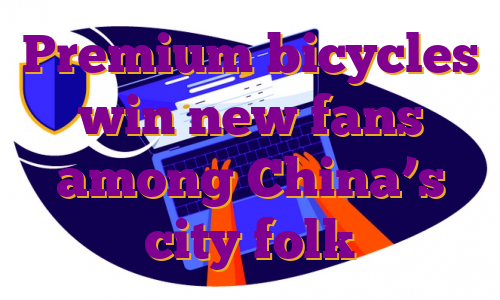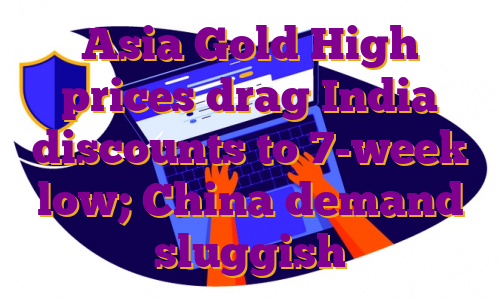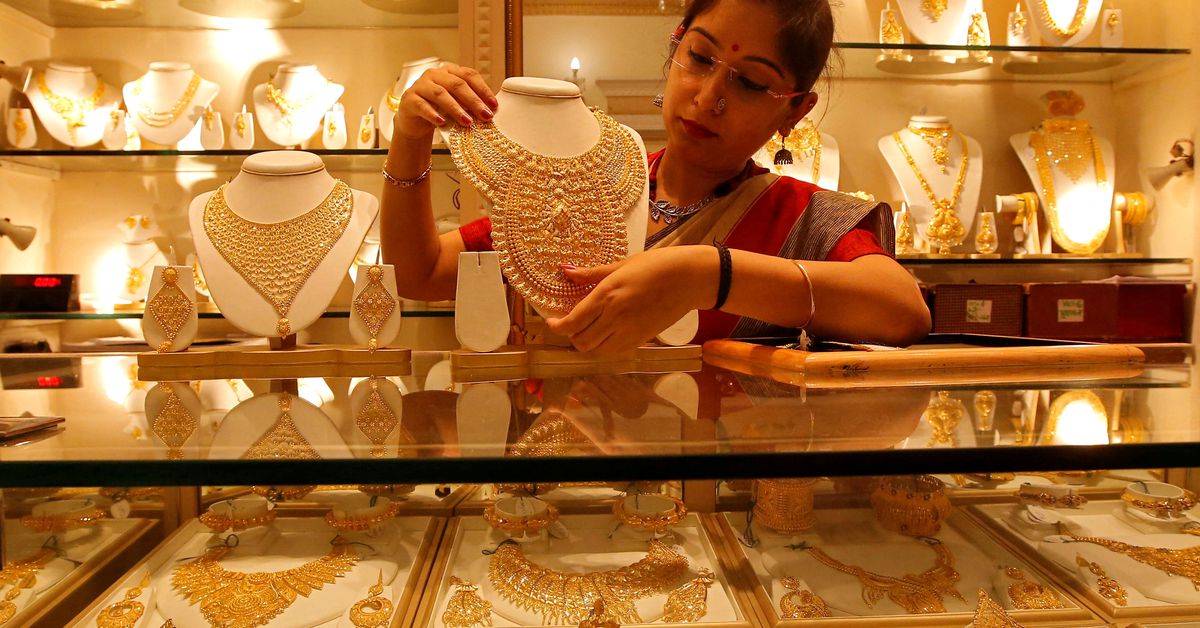Register now for FREE unlimited access to Reuters.comBEIJING, Sept 13 (Reuters) – Zhou Changchang likes to spend his spare time cruising along the streets of China’s capital with his cycling club friends, on his Tiffany Blue bicycle made by the British company Brompton.The 42-year-old teacher is part of a growing army of cycling enthusiasts in China, who are splashing out on premium bicycles made by the likes of Brompton, Giant and Specialized, fuelling a market that consultancy Research & Markets estimates could be worth $16.5 billion by 2026.Social media and e-commerce platforms say there has been a surge of interest in cycling over the past year and sales of bicycles and gear are booming.Register now for FREE unlimited access to Reuters.comTypically, Chinese cyclists will pay more than 13,000 yuan ($1,870) for an inner-city, high-end foldable bike made by the likes of Brompton. High-performance road bikes, made for longer journeys, start at around 10,000 yuan ($1,450) and can go many times higher.Last month, media reported that a bicycle made by luxury brand Hermes sold for 165,000 yuan ($24,500).”The majority of riding hobbyists are willing to splurge,” e-commerce platform JD.com said last month.It said road bike sales on its platform had more than doubled from June to August compared with the same time last year, while riding apparel sales had jumped 160%.China has had a long love affair with bicycles and was once known as the “kingdom of bicycles”.For decades, bikes made by the likes of the Flying Pigeon company filled the streets.Cycling fell out of fashion when a growing middle class turned to cars but bike manufacturers saw a revival in 2014 as bike-sharing companies like Mobike and Ofo sprang up to flood cities with their fleets, offering rides as cheap as 1 yuan.Zhou, like many cyclists, said he got into biking to get fit. COVID-19 and its lockdowns also created a urge for the open road.”I really longed for the outdoors and fresh air,” said Shanghai office worker Lily Lu who went out and ordered a Brompton bike for 13,600 yuan ($1,965) the day after she was released from a three-month lockdown.As the craze gathers pace, manufacturers are struggling to meet demand. Lu said she had to wait two months to get her bicycle. Brompton did not respond to a request for comment.China’s Pardus, which makes racing bikes that can cost more than 30,000 yuan ($4,335), said sales doubled from last year and its factory was operating around the clock.”Everything is out of stock,” said Pardus branding director Li Weihai.
($1=6.96 yuan)Register now for FREE unlimited access to Reuters.comReporting by Sophie Yu, Brenda Goh; Editing by Robert BirselOur Standards: The Thomson Reuters Trust Principles. .
AppLovin offers to buy video game software maker Unity in $17.5 bln deal
People play “Pokemon GO” on the Pokequan GoBoat Adventure Cruise in the Occoquan River in the small town of Occoquan, Virginia, U.S. August 14, 2016. REUTERS/Sait Serkan GurbuzRegister now for FREE unlimited access to Reuters.comAug 9 (Reuters) – Gaming software company AppLovin Corp (APP.O) made an offer on Tuesday to buy its peer Unity Software Inc (U.N) in a $17.54 billion all-stock deal, threatening to derail Unity’s announced plan to acquire AppLovin’s smaller competitor ironSource .AppLovin has offered $58.85 for each Unity share, which represents a premium of 18% to Unity’s Monday closing price. Unity will own 55% of the combined company’s outstanding shares, representing about 49% of the voting rights.AppLovin hired advisors to work out an offer after Unity last month said it would buy ironSource in a $4.4 billion all-stock transaction, sources familiar with the matter told Reuters. Unity’s board will have to terminate the ironSource deal if it wants to pursue a combination with AppLovin, according to the proposal.Register now for FREE unlimited access to Reuters.comUnder the proposed deal, Unity’s Chief Executive John Riccitiello will become CEO of the combined business, while AppLovin Chief Executive Adam Foroughi will take the role of chief operating officer.Unity said its board would evaluate the offer. The company is slated to report its earnings after the bell on Tuesday.Both companies make software used to design video games. Game-making software has also been expanding to new technologies such as the so-called metaverse, or immersive virtual worlds.Unity’s software has been used to build some of the most-played games such as “Call of Duty: Mobile,” and “Pokemon Go”, while AppLovin provides helps developers to grow and monetize their apps.AppLovin’s offer comes as game developers and console makers warn of a slowdown in the sector as decades-high inflation and easing of COVID-19 restrictions lead gamers to pick outdoor activities. The company lowered its sales guidance on Tuesday.”The deal comes as surprise to everybody in the business,” said Serkan Toto, founder of game industry consultancy Kantan Games. “It’s a $15 billion company going after a $15 billion company. It’s a desperate attempt to consolidate and the chances of this deal happening are very slim.”Shares of Palo Alto, California-based AppLovin, which went public last year, fell 9.9% while those of Unity rose 1% in the morning trading session. Shares of ironSource were down 9.7%.Foroughi said the combined company will have the potential to generate an adjusted operating profit of over $3 billion by the end of 2024.Register now for FREE unlimited access to Reuters.comReporting by Eva Mathews and Nivedita Balu in Bengaluru, Krystal Hu in New York; Editing by Saumyadeb Chakrabarty and Mike HarrisonOur Standards: The Thomson Reuters Trust Principles. .
Asia Gold High prices drag India discounts to 7-week low; China demand sluggish
A saleswoman displays a gold necklace inside a jewellery showroom on the occasion of Akshaya Tritiya, a major gold buying festival, in Kolkata, India, May 7, 2019. REUTERS/Rupak De ChowdhuriRegister now for FREE unlimited access to Reuters.com
- India sees discount of up to $10/oz vs $9 last week
- Indian buyers will wait for a hefty correction- dealer
- Buyers in China cautious, conserving their expenditure – analyst
June 10 (Reuters) – Gold discounts in India this week were stretched to their highest level in seven weeks as higher prices repelled demand, while fresh concerns over the spread of COVID in top-consumer China left buyers reluctant to make purchases.This week, dealers in India were offering a discount of up to $10 an ounce over official domestic prices — inclusive of the 10.75% import and 3% sales levies, up from the last week’s discount of $9.Retail buying in India will remain weak, especially from rural areas as farmers focus on planting of summer-sown crops, said a Mumbai-based dealer with a private bullion importing bank.Register now for FREE unlimited access to Reuters.com“In May, prices were attractive. Retail consumers were buying for weddings. Now buyers will wait for a hefty correction,” the dealer said.Weddings are one of the biggest drivers of gold purchases in India.In China, gold was being sold at a discount of $1.5 to a premium of $0.5 an ounce versus global benchmark spot rates .Physical gold demand in China is pretty sluggish, StoneX analyst Rhona O’Connell said, adding that people haven’t been coming back into the market yet after lockdowns were eased, as they are cautious about the outlook and are conserving their expenditure for now.China’s commercial hub of Shanghai faces an unexpected round of mass COVID-19 testing for most residents this weekend – just 10 days after a city-wide lockdown was lifted. read more COVID-related restrictions weighed on demand in China in May and “the average trading volumes of Au9999 – a proxy of Chinese wholesale gold demand – witnessed the weakest May since 2013,” the World Gold Council said in a monthly note.In Hong Kong, gold continued to be sold at a discount of about $1.8 an ounce to a $1 premium, while in Japan, gold was sold between a premium of 50 cents and at par with the benchmark.Register now for FREE unlimited access to Reuters.comReporting by Eileen Soreng, Bharat Govind Gautam in Bengaluru, Rajendra Jhadav in Mumbai; Editing by Shailesh KuberOur Standards: The Thomson Reuters Trust Principles. .
Retailer Canadian Tire to strengthen game with over $2 bln investment
People walk out of a Canadian Tire Store that is located by a Mark’s clothing store, which is owned by Canadian Tire Corporation in Toronto, May 8, 2014. REUTERS/Mark Blinch Register now for FREE unlimited access to Reuters.comMarch 10 (Reuters) – Canadian Tire Corp Ltd (CTCa.TO) said on Thursday it would invest C$3.4 billion ($2.66 billion) over the next four years on its physical and online presence, as it looks to build on the gains made from the pandemic-led online surge.To lure more customers and get a bigger share of their spend as competition grows, retailers are beefing up their online business and offering everything from attractive loyalty programs to personalized promotions online.Toronto, Ontario-based Canadian Tire said it would expand its rewards program and rollout its premium annual membership across its stores nationwide, while also introducing over 12,000 new products under its owned brands by 2025.Register now for FREE unlimited access to Reuters.comThe owner of SportChek and Mark’s store banners also said it would invest about C$675 million to boost its supply chain infrastructure by adding more warehouse space and opening a new e-commerce fulfillment center.Shipping delays and product shortages plagued retailers last year, forcing them to look at ways to strengthen their supply chains to ensure well-stocked shelves to meet rising consumer demand.Canadian Tire said about C$1.2 billion of its investment would go toward improving the connection of its digital and physical channels, to boost its same-day pickup options, including curbside.Canadian Tire said it expects to grow same-store sales, excluding fuel, by more than 4% annually by 2025, with a profit target of more than C$26 per share.RBC analyst Irene Nattel said the forecast was likely “well above Street expectations.”The company reported earnings of C$18.38 per share last year and had recorded a nearly 30% surge in e-commerce sales.($1 = 1.2803 Canadian dollars)Register now for FREE unlimited access to Reuters.comReporting by Deborah Sophia and Praveen Paramasivam in Bengaluru; Editing by Shinjini GanguliOur Standards: The Thomson Reuters Trust Principles. .
Australia’s AGL Energy rebuffs sweetened $4 bln bid from Brookfield-led team
AGL Energy’s Liddell coal-fired power station is pictured in the Hunter Valley, north of Sydney, Australia, April 9, 2017. REUTERS/Jason ReedRegister now for FREE unlimited access to Reuters.com
- New offer pitched at 15% premium to pre-bid price
- AGL says demerger offers better value to shareholders
- AGL shares slip but hold above pre-bid price
MELBOURNE, March 7 (Reuters) – Australia’s AGL Energy confirmed on Monday it rejected a sweetened A$5.4 billion ($4.0 billion) takeover proposal from tech billionaire Mike Cannon-Brookes and Canada’s Brookfield Asset Management (BAMa.TO), saying it still undervalued Australia’s top power producer.Brookfield and Cannon-Brookes said they had walked away, leaving AGL to pursue plans to split its coal-fired power business from its energy retail business. AGL is Australia’s biggest carbon emitter and the consortium had planned to speed up the closure of its coal-fired power plants.”We are no longer engaged,” a Brookfield spokesperson said, declining to comment further.Register now for FREE unlimited access to Reuters.comThe revised proposal was pitched at A$8.25 a share, a 15% premium to AGL’s share price on Feb. 18, ahead of a first surprise approach from the Brookfield-led consortium at A$7.50 a share. The premium above AGL’s close last Friday.AGL’s shares fell 1.2% to A$7.34 on Monday but stayed above their pre-bid price.AGL is looking to split into two companies called Accel and AGL Australia following a 75% slump in the group’s value over the past five years, hammered by an influx of cheap solar and wind power and government pressure on utilities to slash power prices to households.Chief Executive Graeme Hunt said the demerged businesses would both have growth prospects in the shift to cleaner energy, with the biggest energy retail customer base in AGL Australia and valuable energy sites with 2.7 gigawatts of projects in the Accel business.”We see that the combined value of both entities is higher than the value of the company as it stands today, but none of that has been reflected in the offer that we received,” Hunt told Reuters.Cannon-Brookes said on Twitter the demerger path “was a terrible outcome for shareholders, taxpayers, customers, Australia and the planet we all share”.Fund managers who have shunned AGL’s shares over the past few years said it was hard to put a value on its demerger plan in a market that faces a range of challenges in the energy transition.Morgan Stanley raised its price target AGL to A$7.50 from A$6.88 on Friday and said there was potential for a 25% to 30% rise in a scenario in which all its coal-fired plants are closed by 2030 and it invests in 10 GW of renewables and back-up capacity.($1 = 1.3570 Australian dollars)Register now for FREE unlimited access to Reuters.comReporting by Sonali Paul in Melbourne and Savyata Mishra in Bengaluru; Editing by Chris ReeseOur Standards: The Thomson Reuters Trust Principles. .








